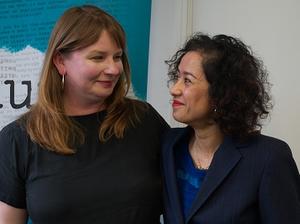BBC “defended the indefensible” by spending more than £1m fighting discrimination cases
The corporation has disclosed it paid more than £1 million to external barristers and solicitors to deal with tribunal claims brought by staff in equal pay and race discrimination cases.

Michelle Stanistreet and Samira Ahmed after her tribunal victory
© NUJ
The BBC has disclosed it paid more than £1 million to external barristers and solicitors to deal with tribunal claims brought by staff in equal pay and race discrimination cases.
The BBC was unable to put a figure on additional costs of using in-house lawyers to deal with staff allegations concerning equal pay or race discrimination. However, it acknowledges that more than 2,000 hours were spent on such cases. The figures do not cover costs of ongoing tribunal claims.
Michelle Stanistreet, general secretary, said:
"It's a shocking sum of money to have spent on defending the indefensible. There have been so many occasions in the past four years when the NUJ has urged the BBC to stop wasting money on lawyers and instead sort things out sensibly with individuals who have been discriminated against and cheated out of pay and pension contributions.
"There have even been equal pay cases amongst them where we have been confident that the arrears in salary owed were ultimately dwarfed by the cost of the legal team arguing against settling.
"The NUJ has worked hard to stamp out pay inequity and discrimination at the BBC – in acknowledging the financial cost of defending these cases, albeit an incomplete total, the BBC should reaffirm its commitment to resolving outstanding cases, boosting transparency, stamping out discrimination and working with the unions to achieve genuine equity at work."
The disclosures were made in a letter published by the Digital, Culture, Media and Sport Committee (DCMS) after pressing director general Tim Davie for the figures. The House of Commons cross-party committee wrote to Tim Davie in December after the BBC said it was "not possible to provide a total cost for external counsel fees" for equal pay employment tribunal claims nor race related claims brought by staff. The committee said it would be calling on the newly-appointed BBC chair Richard Sharp to investigate the legal bill as a priority.
The NUJ supported presenter Samira Ahmed in a successful high-profile equal pay case which determined that her work presenting BBC's Newswatch programme was equal to that of Jeremy Vine on Points of View, despite him being paid six times more.
The union also supported Carrie Gracie who resigned from her position as China editor in January 2018 because, despite assurances on her pay, she was paid less than male colleagues in similar roles. She was eventually given a full apology by the corporation and backpay.
Sarah Montague, former presenter of Radio 4's Today programme, confirmed in January she had won a £400,000 settlement and an apology from the BBC over unequal treatment.
Julian Knight MP, chair of the DCMS Committee, said:
"It is unbelievable that the BBC has spent more than £1 million of licence fee payers' money fighting claims brought by its own staff about equal pay and race discrimination.
"Money that could have gone into making programmes or alleviating licence-fee costs for the over 75s has instead been used to pay the salaries of barristers and lawyers.
"This information was not forthcoming. It was only as a result of the DCMS Committee pressing director general Tim Davie for an answer that the shocking size of the BBC's legal bill has been revealed.
"The BBC's line that it had to divert resources in order to gather the information we requested is frankly completely unacceptable and shows a disregard for public scrutiny.
"And this at a time when the corporation is struggling to balance its books with hundreds of journalists' jobs being cut. This disclosure sits uncomfortably against the BBC's claim that it offers value for money. It must now offer a full explanation of how legal costs were allowed to escalate to such levels. We will be calling on the newly appointed BBC chair Richard Sharp to investigate as a priority."
